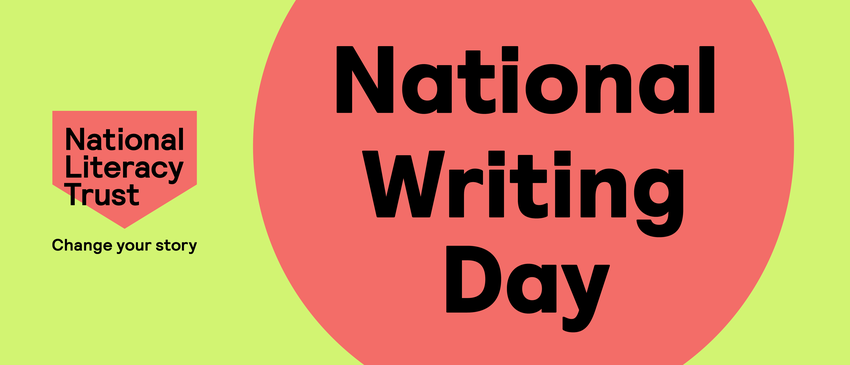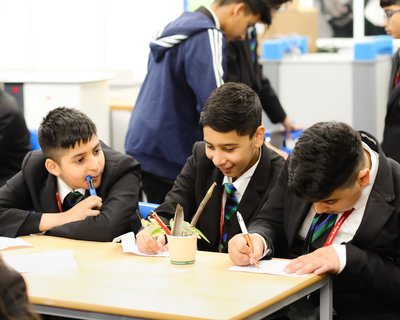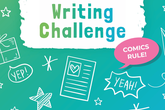National Writing Day 2026

What is National Writing Day?
National Writing Day is an annual celebration of the power of writing creatively, inspiring people of all ages and abilities to try writing for fun and self-expression.
Why do we celebrate National Writing Day?
This occasion provides a great opportunity to celebrate the reasons why young people write - including creativity, mental wellbeing, and social action or connection - and to encourage everyone to find their own writing motivation and voice.
When is National Writing Day?
In 2025, National Writing Day happened on Wednesday 25 June.
The date for National Writing Day is set each year, normally falling in the third week of June. We'll add the date for 2026 here as soon as it is confirmed.
Read on to learn more about writing motivation and benefits, and to discover resources to help you celebrate the day.
Writing research
Our recent research in to Children and young people's writing in 2025 found that:
- Only 1 in 4 (26.6%) children and young people aged 8 to 18 said that they enjoy writing in their free time.
- Levels of writing enjoyment have almost halved over the past 15 years, decreasing by 20.2 percentage points since 2010.
- Just 1 in 10 (10.4%) children and young people told us that they wrote something daily in their free time.
- Five times as many children and young people aged 8 to 18 who enjoyed writing wrote something daily compared with those who didn't enjoy writing (25.2% vs 5.0%).
- Of children and young people aged 8 to 18 who wrote at least once a month, 1 in 2 (48.7%) did so to be creative, while more than 2 in 5 wrote to express their ideas and imagination (45.8%) or their thoughts and feelings (40.8%).
The Impact of Writing for Enjoyment Programmes
Our report brings together insights from the various writing projects that sit within the National Literacy Trust's Young Writers programme to highlight the important role writing can play in the lives of children and young people.
Learn more in our report on The Impact of Writing for Enjoyment Programmes
Why writing is important
Writing is a lifelong skill empowering communication and self-expression. It is crucial to children and young people’s development as it enhances self-confidence and critical thinking skills, but also encourages creativity.
Writing is also part of everyday life, from making plans with friends over text or WhatsApp, helping with children’s homework, writing emails in the workplace, or even making a shopping list. However, 1 in 3 children currently leave primary school without the writing skills they need to succeed in life.
At the National Literacy Trust, we champion writing for enjoyment as a key part of supporting children and young people’s writing attainment.
Writing for enjoyment:
- supports mental wellbeing
- inspires creativity
- helps children express their thoughts and feelings
- improves writing skills.
We believe writing doesn’t just belong in an English lesson but can be used as a fun way to explore many different ideas and topics. We know that writing for enjoyment has the wonderful ability to boost children and young people's wellbeing and help them feel connected to the world. In our writing resources, you’ll find activities that will help bring writing for enjoyment into every corner of your classroom.
When we asked children and young people to tell us why they write, we identified 10 writing motivators which we grouped conceptually to form three categories of young writers:
- the creative writer
- the mindful writer
- the social writer
Our resources and writing programmes are designed for them.
National Writing Day resources
To help you mark National Writing Day - and to celebrate writing throughout the year - we created classroom resources including insights and activities for early years children as well as inspiration and ideas you can use with pupils aged 4 to 14.
Writing for pleasure activities for schools
This resource provides an innovative range of classroom writing games, prompts and ideas you can use in primary or secondary schools to celebrate writing, reflect on reasons for writing and encourage everyone to find their own motivation and voice.
Supporting writing in the early years
For children in early years settings, we know that early experiences of writing will have significant influence on their views and feelings about writing as they get older and learn the necessary skills to become successful writers. Our resource explores how to support children in their earliest years to develop a positive view of themselves as writers, develop an interest in the purpose of writing, and to begin to recognise the power of writing as a tool for communication.
Early years activities supporting writing
More writing resources
Explore the resources linked below to discover classroom ideas and session plans aligned to creative, mindful and social writing.
Creative writing
-
Teaching sequence and resources to run our Comics Rule! writing challenge in your classroom, exploring the exciting world of comics and graphic novels.Learn more
-
We developed these Comedy Classroom resources in partnership with BBC Learning. They provide a framework to explore comedy writing with pupils while enjoying plenty of...Learn more
-
Writing from Silence is a combination film and writing for enjoyment resource. The film takes pupils on a journey into the past, through an interactive tour of the National...Learn more
Mindful writing
-
Created in partnership with the RSPB the Writing from Nature resources are designed to widen access to, deepen knowledge of, and increase appreciation of the natural world...Learn more
-
Set up a writing club in your school to help establish a whole-school writing culture.Learn more
-
Ideas and activities to support your school in using diaries as an introduction to autobiographical writing and as a way of promoting family and community engagement.Learn more
Writing programmes
Our writing programmes for schools inspire children and young people to write for enjoyment and help them to improve the quality of their writing.







Social writing: championing change and making connections